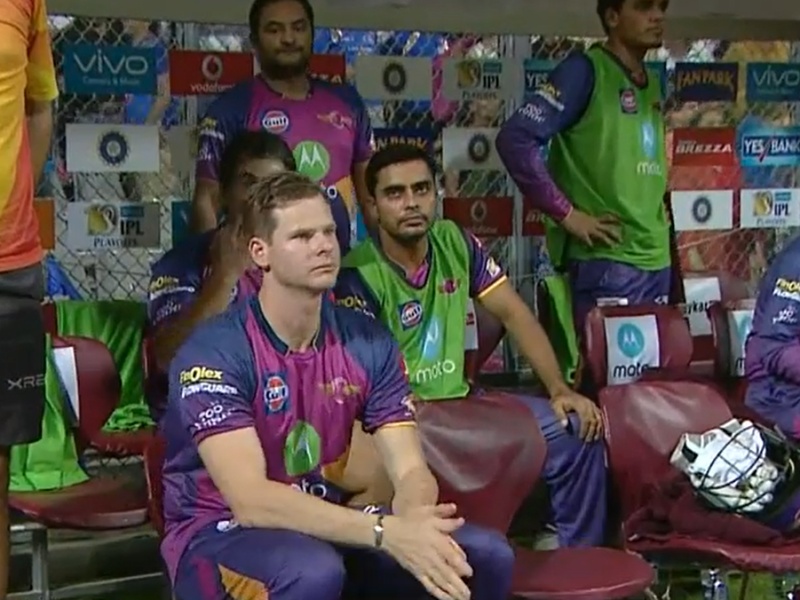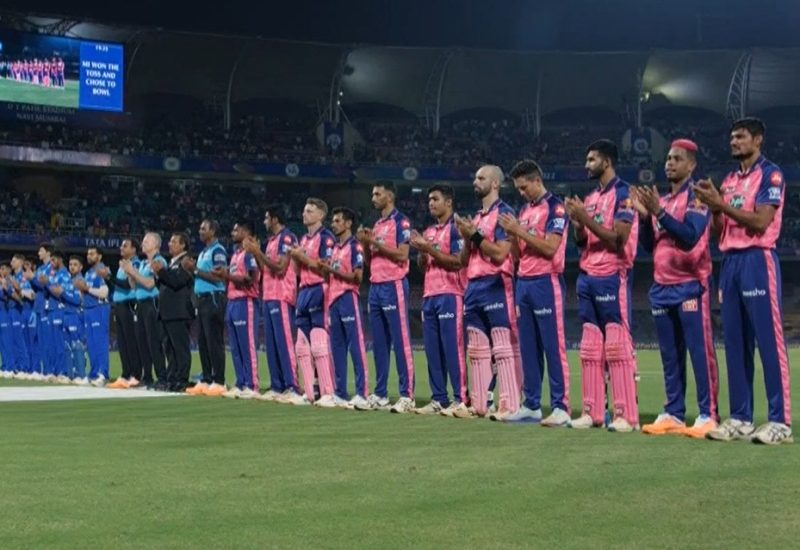The 2023 IPL will see the introduction of the Impact Player. This is a player outside the starting XI who can come in to bat, bowl or both – a sub in other words. We put it to you that tactical substitutions make cricket worse.
This year’s IPL starts on March 31 with the final scheduled for May 28. They announced the Impact Player thing back in December, but we didn’t report it because honestly who gives a…
How will the Impact Player rule work?
Each team will list four substitutes at the toss. They will then be allowed to use one of them as their Impact Player.
That player can be introduced at pretty much any moment in the match. As far as we can tell, just about the only thing they can’t do is come in to finish someone else’s over.
One interesting element is that the Impact Player won’t inherit the bowling allocation from the player being subbed off. That means the captain could give someone four overs and then sub them off for another bowler.
That would mean you could pick an extra batter in your starting XI, which so often seems to be the goal with these innovations.
Why does the Impact Player rule make cricket worse?

Wrong-headed extrapolation.
There’s always been this idea in cricket administration that fans want to see the best players and that the best against the best is therefore all anyone wants. There’s then this temptation to try and engineer the game to give people the best batters and the best bowlers and nothing else.
T20 cricket is already a good few steps along this road. In a 20-over game, there’s no guarantee that everyone will bat. A lot of people assume this is great even though the most exciting T20 matches are often the ones where everyone does bat.
Just the same as with a Test match, there’s a lot more jeopardy and therefore a lot more excitement when the outcome of a game rests in the hands of those least qualified to do the job.
Matches feel like a bigger deal when the best players are involved, but cricket is at its most exciting when matches that are a big deal are decided by ordinary mortals. You need both those things. Cricket’s habit of routinely throwing people of limited ability into elite sport scenarios is a large part of the reason why it is the greatest sport of all.
Tail-enders are great. Part-time bowlers are great. Trying to muddle through in one area so that you can pick a specialist in another area is great.
One of the best things about the selection of a cricket team is trying to effectively give yourself an extra batter or bowler without actually having the option of using a 12th player.
Tactical substitutions make cricket worse.
Read our features, get our email, help fund us.



All the rule changes seem a bit unnecessary to me. If you really want to see only the best batters and the best bowlers and maybe an all-rounder in there somewhere, then cricket already has a time-honoured tradition for it: just play 15-a-side with 11 batting and 11 fielding.
What’s interesting is that for the last few hundred years, such matches have been viewed as lesser than “first-class” matches which restricted teams to 11. And forced even the most rabbity of bowlers to bat. Because that’s proper cricket, for all the reasons given above.
Jack Leach is not among the top 1000 batsmen in England Wales. I’m confident Monty Panesar was not among the top 10,000, and suspect more zeroes could be appended. The thrill of their famous last wicket stands would be incalculably smaller if England’s number 11 batsman were the 11th best batsman in England.
In reality, we’re never going back to Timeless Tests so there’s no real risk of all-specialist batting orders in the long format. T20 has its own evolutionary dynamics, and the joy of the last-wicket draw isn’t a factor: stacking the batting order means more aggressive risk-taking, more boundaries (and attendant higher sponsorship opportunities), and lower chance of a contest-killing, early-finishing, less-chance-to-cram-in-the-ad-breaks, embarrassing skittling.
The National League in Baseball has finally brought in the Designated Hitter: if you believe it’s not baseball unless everyone bats, then the whole of MLB is now no longer baseball. I liked watching them bat personally, but that may have been a kind of sadism on my part, a little joy in my life that someone (else) is getting paid to do a job that at least one half of, they’re not actually very good at.
But in general, baseball fans didn’t enjoy watching bunts in the same way that Test cricket fans appreciate a cheeky nurdle. If there’s a significant market of T20 fans who’d rather watch a proper batter at the crease, then so be it: though at least a baseball DH is going to see some action, whereas a lower-order T20 “14th man” batting specialist may only rarely bat, and even then usually in a lost cause. That would be a pretty soul-destroying existence as a professional specialism but also makes team rosters mostly pointlessly more expensive from the commercial perspective.
https://www.sportingnews.com/uk/mlb/news/mlb-universal-dh-national-league-pitchers-hitting-2022/r1kbh2jzlpsxrydqqmkqonwq
Despite supporting an American league team, I don’t like the universal DH. It was kinda neat having different rules between the two leagues – and the occasional home run hit by pitchers who were clearly no good at batting was always fun to see. I’m not really a fan of pinch runners either, I liked seeing the people slower than molasses on the base paths.
(slightly off topic but a recent example from Spring Training, an inside the park home run scored by a man who really didn’t want to – https://twitter.com/RyanDivish/status/1635765576181362690?s=20)
Bunts, eh. I don’t much like them but that’s really because they almost never work. That said, baseball is a bit stuck in Moneyball statistical overanalysis leading to too many batters taking the three true outcomes approach (home run, walk, strikeout). Hopefully some of the tweaks they are making this season will lead to a few more balls in play and more base runners.
You had me at ‘honestly who gives a…’
When does the county championship start?
I am all in favour of innovations that make the game exciting and attract new/increasing numbers of fans to cricket.
This change is clearly an attempt at one of those. It should please the broadcasters, plus the gambling “industry” (legal and illegal), as it increases the chance that the trailing side might steal a win from defeat – assuming that side has “held back its joker” for such a circumstance.
My beef with it as an idea is that it doesn’t readily translate into the recreational or casual game, whereas shorter form cricket generally does feel more like the fun cricket that we mere mortals get to play.
Comments above talking about designated hitters in baseball are interesting in this context, not least because baseball (professional and recreational) is in decline in the USA right now. I hope this minor innovation in the IPL is not a similar sign of desperation to maintain interest / seed growth.
Yes I was intending to mention the recreational game implications at the end, next to the soul-destroying nature of being a pro batter who almost never bats and the commercial problem of getting hold of someone who isn’t going to do very much, but forgot to. But some of the recreation issues are analogous. Aside from the difficulty of getting a team of 15 together when 11 is hard enough, the very low order batters will have very little to do. They might field I suppose if the bowlers are only sent on for their overs – but however you arrange it, there’d be a lot of sitting about for someone.
If you really wanted to go this route, it might make more sense to either retire batters out after a certain number of balls, or at a certain score, as you might see in youth leagues. Or more likely, go the baseball route and have batters on rotation somehow – maybe at the end of every over or two, two fresh batters have to rush out of the dug-out. (Unless you’re nine down, in which case one of the active batters stays on.) Once you’re out you stay out, but otherwise you’ll come back on again once your turn comes around.
That would be a faff but it would solve the perpetual “spent all day playing the game but didn’t get a chance to bat or bowl” problem so it wouldn’t be crazy for the recreational game. At the professional level you’d see a stronger batting line-up, but batters wouldn’t have much chance to get set (even in T20 that’s a thing and often a prelude to the big tee-off we love to watch) and you’d likely see a bit less of the star batters who are supposedly the main draw.
Something like that would change the rhythm and nature of the game, but it might be worthy of more consideration. One place it would clearly help is the safety issue of bowlers who aren’t very good at batting, facing some very fast bowlers. Pitchers getting injured batting is one reason baseball has gone for the universal DH. Cricket has all kinds of discussions about what’s acceptable for a nasty quick to do to tail-enders. And at the recreational level, there are definitely bowlers who drop out of the sport, or prefer to go down and play at a lower level, because they don’t enjoy facing fast bowling.
Baseball comparisons are interesting given that today is the eve of the World Baseball Classic (which Great Britain took qualified for, for the first time, and did well enough to gain a berth for the next time, despite their awful kit design), and also seems to be a big day for Major League Cricket…
Indeed! The Japan-Mexico game yesterday was very good indeed.
I’m going to keep taking excuses to pimp Seattle Mariners content, not that most of you are interested. The “British” baseball team isn’t very good, but Harrison Ford (really! But he goes by Harry, understandably) is going to be very good in a few years. He’s sort of British, both his parents are, but he’s from Atlanta. Some of the attempts at celebrating were somewhat cringey.
https://twitter.com/MarinersONtap/status/1635026619881623552?s=20
Am I being overly cynical in thinking this is also something else that can be sponsored?
Oh I do hope so. I especially enjoyed the fact that the TV reviews in Bangladesh these past few weeks were/are sponsored by Mr White Detergent Powder.
https://www.jyothylabs.com/products/mr-white/
It just seems such a shame that the sponsors couldn’t persuade teams to play those cricket matches in whites, as an additional opportunity to highlight the benefits of the sponsor’s products. That would have felt like a great leap forward, to me.
Oh that’s fabulous. I do hope they also sponsor the impact player in the IPL. Imagine:
“The entire Rajasthan team looked hopeless till the arrival of the White player”.
“White player rescues Delhi again”.
“Indian team clueless against the White talent”.
Manjrekar on TV: “Oh that’s another game decided by the impact player. IPL is clearly demonstrating White superiority”.
I am all for this development. I stopped pretending IPL was about cricket a long time ago.
I don’t really follow the IPL any more, but one rule change I’m looking forward to is for teams to name their XIs *after the toss*. Everywhere really, but particularly in India, T20 games are extremely skewed in favour of the chasing team. This new rule may even things out a bit.